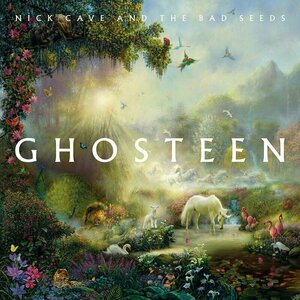Search
Search results
Kirk Bage (1775 KP) rated Ghosteen by Nick Cave & The Bad Seeds in Music
Mar 3, 2020 (Updated Aug 6, 2020)
My intention was to listen to this twice through and then tell you what I thought about it. In the past, I have always admired Nick Cave more in theory than in practice. Finding his heavier touches a little too “noisy”. Typified by the 2004 release Abbatoir Blues / The Lyre of Orpheus, where I listened to the latter, gentler side over and over, and largely left the more raucous tracks on the former alone.
Because of this personal preference, I have ended up virtually listening to Ghosteen on loop for a full week, as it leans very definitely towards the softer side of his soul – at times almost ambient dreamscape, washing over you like tired thoughts just before sleep. And, often, that is what it became for me: a night album to drift away to.
It is an album about grief, regret, spirituality and humanism. There is a misconception that it is wholly inspired by the death of Cave’s son Arthur, but, in his own words, it was more the death of band member Conway Savage that allowed the themes and lyrics to become the work.
As always, it is Cave’s poetry that emerges as the backbone and soul of every song. The melodies wash over you, at times indistinguishable as separate tracks, and you begin to feel invited into a man’s heart and mind as he explores mortality, shifting between anger, acceptance, fear and hope, in a segue of sound that feels ultimately like a mood painting, defying criticism.
At times listening feels like an intrusion; like these thoughts are too personal to eavesdrop on. At other times, you feel taken by the hand and invited to look at something beautiful. If you allow yourself to be taken on this journey willingly, your empathy will be coaxed and encouraged, and it will be safe. Sadness is only one part of grief, seems to be the message, and it’s a message I relate to and adore.
Labels such as “art-rock” and “post-punk” get thrown at Cave, in futile efforts to pin him down. I think it best not to try. For me, he is truly one of a handful of musicians alive who can be called an artist without hyperbole. His work has texture and emotion that goes beyond how we normally judge music. Making it ok to not “like” a song, as long as it tells part of the story.
For sure his best work for quite a while. At times, so perfect it seems churlish to judge it at all.
Because of this personal preference, I have ended up virtually listening to Ghosteen on loop for a full week, as it leans very definitely towards the softer side of his soul – at times almost ambient dreamscape, washing over you like tired thoughts just before sleep. And, often, that is what it became for me: a night album to drift away to.
It is an album about grief, regret, spirituality and humanism. There is a misconception that it is wholly inspired by the death of Cave’s son Arthur, but, in his own words, it was more the death of band member Conway Savage that allowed the themes and lyrics to become the work.
As always, it is Cave’s poetry that emerges as the backbone and soul of every song. The melodies wash over you, at times indistinguishable as separate tracks, and you begin to feel invited into a man’s heart and mind as he explores mortality, shifting between anger, acceptance, fear and hope, in a segue of sound that feels ultimately like a mood painting, defying criticism.
At times listening feels like an intrusion; like these thoughts are too personal to eavesdrop on. At other times, you feel taken by the hand and invited to look at something beautiful. If you allow yourself to be taken on this journey willingly, your empathy will be coaxed and encouraged, and it will be safe. Sadness is only one part of grief, seems to be the message, and it’s a message I relate to and adore.
Labels such as “art-rock” and “post-punk” get thrown at Cave, in futile efforts to pin him down. I think it best not to try. For me, he is truly one of a handful of musicians alive who can be called an artist without hyperbole. His work has texture and emotion that goes beyond how we normally judge music. Making it ok to not “like” a song, as long as it tells part of the story.
For sure his best work for quite a while. At times, so perfect it seems churlish to judge it at all.
Rat (1 KP) rated Peaky Blinders - Season 1 in TV
Mar 28, 2018
Forget everything you think you know about period drama
It would be easy to dismiss Peaky Blinders as just a British drama. It would be easy to dismiss it as just a period piece. It would be easy to claim that it was just a British Boardwalk Empire. You'd be so wrong to do so.
Every part of Peaky Blinders is perfection. From the superb acting of its regular cast (Cillian Murphy on a tv show? Sign me up!) to a roster of featured guests (Sam Neill? Tom Hardy? Adrien Brody? Who did the casting director sell their soul to, anyway?) to the use of colour and an outlaw music soundtrack that shouldn't work, but does (Nick Cave? PJ Harvey? Tom Waits? David Bowie? On a period drama? What is this? Freaking genius, that's what.)
Shortly after the end of the first World War, a family of Irish gypsy (their word, not mine) - blooded Birmingham bookmakers tries to recover from the horrors of that war and build up their business. Second oldest, Tommy Shelby (played expertly by Cillian Murphy who manages to play a gangster who is both ruthless and fragile with the ability to break your heart with a single look), came back from the war broken by his experiences, but determined to rise far beyond the limitations of his Small Heath upbringing. Not only does he have the expected clashes with those who want to keep him from growing his business (both criminal rivals and the police) but he has a family to run (with all the interpersonal conflicts that entails). All of this is set against a backdrop of political turmoil from the IRA and the rise of communist sympathy in the UK.
You shouldn't like Tommy Shelby, but he is written and acted so well that you won't be able to not like him. The same can be said for older brother, Arthur, younger siblings John, Ada, and Finn. If you don't love Aunt Polly, then you must have a problem with strong female characters.
Steven Knight has taken a world told to him through family legend and turned it into a world that you will be eager to inhabit an hour (or, if you're like everyone I know, a season) at a time. He writes a period drama that doesn't feel dated. The characters and their struggles are as relevant today as they were nearly a hundred years ago.
Take a chance on the show with the weird name and discover why there are very few casual Peaky Blinders fans. There's a reason why the late, great David Bowie was a huge fan and made sure that they would have a song from his last album before he died. There's a reason the show's dated fashion and hairstyles are making a comeback, why Peaky Blinders pubs and pub nights are popping up all over. It's that good. Check it out for yourself.
Every part of Peaky Blinders is perfection. From the superb acting of its regular cast (Cillian Murphy on a tv show? Sign me up!) to a roster of featured guests (Sam Neill? Tom Hardy? Adrien Brody? Who did the casting director sell their soul to, anyway?) to the use of colour and an outlaw music soundtrack that shouldn't work, but does (Nick Cave? PJ Harvey? Tom Waits? David Bowie? On a period drama? What is this? Freaking genius, that's what.)
Shortly after the end of the first World War, a family of Irish gypsy (their word, not mine) - blooded Birmingham bookmakers tries to recover from the horrors of that war and build up their business. Second oldest, Tommy Shelby (played expertly by Cillian Murphy who manages to play a gangster who is both ruthless and fragile with the ability to break your heart with a single look), came back from the war broken by his experiences, but determined to rise far beyond the limitations of his Small Heath upbringing. Not only does he have the expected clashes with those who want to keep him from growing his business (both criminal rivals and the police) but he has a family to run (with all the interpersonal conflicts that entails). All of this is set against a backdrop of political turmoil from the IRA and the rise of communist sympathy in the UK.
You shouldn't like Tommy Shelby, but he is written and acted so well that you won't be able to not like him. The same can be said for older brother, Arthur, younger siblings John, Ada, and Finn. If you don't love Aunt Polly, then you must have a problem with strong female characters.
Steven Knight has taken a world told to him through family legend and turned it into a world that you will be eager to inhabit an hour (or, if you're like everyone I know, a season) at a time. He writes a period drama that doesn't feel dated. The characters and their struggles are as relevant today as they were nearly a hundred years ago.
Take a chance on the show with the weird name and discover why there are very few casual Peaky Blinders fans. There's a reason why the late, great David Bowie was a huge fan and made sure that they would have a song from his last album before he died. There's a reason the show's dated fashion and hairstyles are making a comeback, why Peaky Blinders pubs and pub nights are popping up all over. It's that good. Check it out for yourself.

